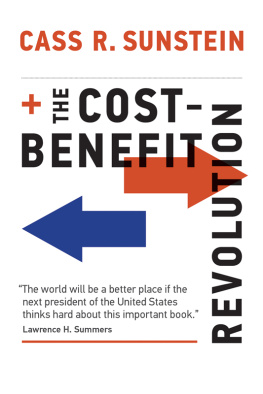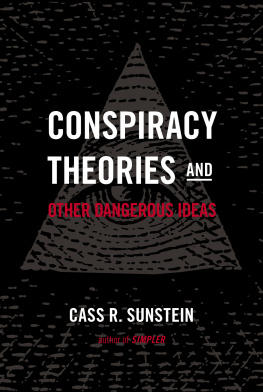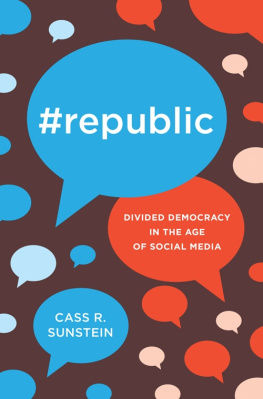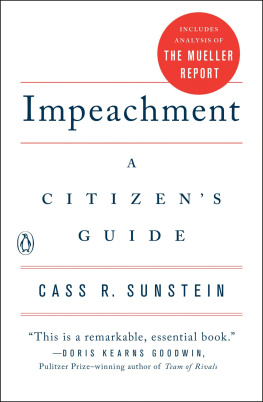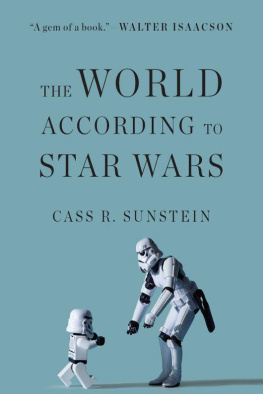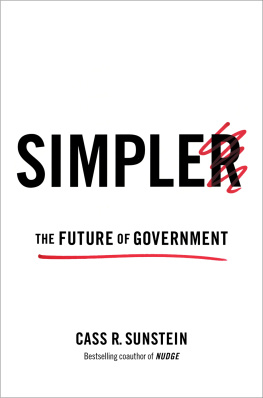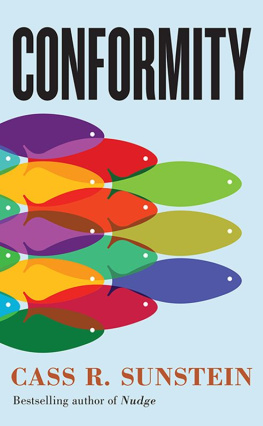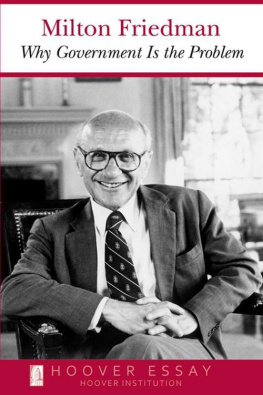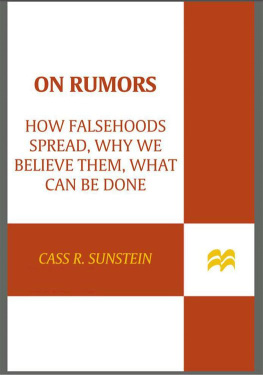The Cost-Benefit Revolution
Cass R. Sunstein
The MIT Press
Cambridge, Massachusetts
London, England
2018 Cass R. Sunstein
All rights reserved. No part of this book may be reproduced in any form by any electronic or mechanical means (including photocopying, recording, or information storage and retrieval) without permission in writing from the publisher.
This book was set in ITC Stone Sans Std and ITC Stone Serif Std by Toppan Best-set Premedia Limited. Printed and bound in the United States of America.
Library of Congress Cataloging-in-Publication Data
Names: Sunstein, Cass R., author.
Title: The cost-benefit revolution / Cass R. Sunstein.
Description: Cambridge, MA : MIT Press, [2018] | Includes bibliographical references and index.
Identifiers: LCCN 2017052759 | ISBN 9780262038140 (hardcover : alk. paper)
eISBN 9780262347242
Subjects: LCSH: Administrative law--United States--Cost effectiveness. |
Trade regulation--United States--Cost effectiveness. | Cost
effectiveness--Political aspects--United States. | Public
administration--United States--Decision making.
Classification: LCC KF5407 .S86 2018 | DDC 361.60973--dc23 LC record available at https://lccn.loc.gov/2017052759
ePub Version 1.0
I must again repeat, what the assailants of utilitarianism seldom have the justice to acknowledge, that the happiness which forms the utilitarian standard of what is right in conduct, is not the agents own happiness, but that of all concerned. As between his own happiness and that of others, utilitarianism requires him to be as strictly impartial as a disinterested and benevolent spectator. In the golden rule of Jesus of Nazareth, we read the complete spirit of the ethics of utility. To do as you would be done by, and to love your neighbour as yourself, constitute the ideal perfection of utilitarian morality.
John Stuart Mill
If there wont be dancing at the revolution, Im not coming.
Emma Goldman
Preface: Against Expressivism
People often have clear intuitions about social problems. Perhaps you are alarmed about pesticides, illegal immigration, unsafe drinking water, highway safety, genetically modified organisms, sugary drinks, terrorism, or climate change. You might favor some measure that will reduce the associated risks.
You may or may not feel strongly. Or perhaps one or more of these issues does not concern you at all, and you are puzzled about why other people are so worried. You might think that they are way off the mark, even nuts.
Arguments about public policy are often expressive. People focus on what they see as the underlying values. They use simple cues. They favor initiatives that reflect the values that they embrace or even their conception of their identity. If the issue involves the environment, many people are automatically drawn to aggressive regulation, and many others are automatically opposed to it. When you think about regulation in general, you might ask: What side are you on? That question might incline you to enthusiastic support of, for example, greater controls on banks or pollutersor it might incline you to fierce opposition toward those who seek to strengthen governments hand.
In this light, it is tempting to think that the issues that divide people are fundamentally about values rather than facts. If so, it is no wonder that we have a hard time overcoming those divisions. If peoples deepest values are at stake, and if they really differ, then reaching agreement or finding productive solutions will be difficult or perhaps impossible. Skepticism about experts and expertiseabout science and economicsis often founded, I suggest, on expressivism.
I aim in this book to combat expressive approaches to policy issues. I contend that contrary to appearances, the issues that most divide us are fundamentally about facts rather than values. (Not all the time, of course, but often enough.) In my view, expressive approaches are a great obstacle to progress. Take the question of highway safety. In 2016, nearly forty thousand Americans died in motor vehicle crashes. That number is far too high, and some imaginable approaches would help. If we can agree on the facts, we should be able to agree on what to door at least our disagreements should be narrowed greatly.
Climate change is far more sharply contested, of course, but even on that issue, agreement on the facts would help us identify reasonable paths forward. On climate change, peoples judgments about the facts may be motivated in one way or another; people believe what they want to believe. It is partly for that reason that in the domain of climate change, judgments about the facts might not be based on knowledge. But if we all knew that climate change would cause devastation, or that it really would not, then we would find it much easier to agree on how to proceed.
As an alternative to expressive approaches, I will explore and celebrate the cost-benefit revolution, which focuses on actual consequenceson what policies would achieveand which places a premium on two things: science and economics. Above all, I will suggest that diverse people should be able to enter into an incompletely theorized agreement in favor of cost-benefit analysis, in the form of an agreement about what to do and how to proceed, amid uncertainty or disagreement about the deepest theoretical issues.
A Celebration
Cost-benefit analysis asks: What are the bad and good effects of imaginable policies? Will we save one life, ten lives, or one thousand lives? Will we impose costs on consumers? What will those costs be, exactly? Will policies hurt workers and small businesses? If so, precisely how much?
Suppose that an effort to increase safety on the highways is expected to save five hundred lives annually and to cost very little. If so, its probably a good idea (whatever our theoretical commitments). But if it is expected to save two lives annually and to cost hundreds of millions of dollars, we might not want to go forward with it (whatever our theoretical commitments).
Cost-benefit analysis reflects a firm (and proud) commitment to a technocratic conception of democracy. The public is ultimately sovereign, but, for good reasons, technocrats are given a lot of authorityby the public itself. Most citizens know that they do not have the background or the time to answer hard questions about food safety, about air pollution, and about carcinogens in the workplace. Cost-benefit analysis insists that difficult questions of fact should be answered by those who are in a good position to answer them correctly. The reason is that consequences matter, and scientists and economists can help us get a handle on consequences.
These claims raise many questions: Who are those experts? Can we trust them? What about their own ignorance and their own biases? Arent they vulnerable to powerful interest groups? Dont they seek to expand their own authority? Mightnt they be foolish or ignorant, too?
These are fair questions. For now, let me offer two suggestions. First, the cost-benefit revolution requires regulators to demonstrate a genuine need for government action. They must always identify some kind of market failure, warranting intervention. Second, the cost-benefit revolution has the advantage of forcing officials to ask the right questions in the domains in which it has been on the ascendency, including environmental protection, highway safety, energy policy, occupational safety, obesity, and food safety. Whether or not an analysis of costs and benefits tells us everything we need to know, at least it tells us a great deal that we need to know. We cannot safely proceed without that knowledge.

